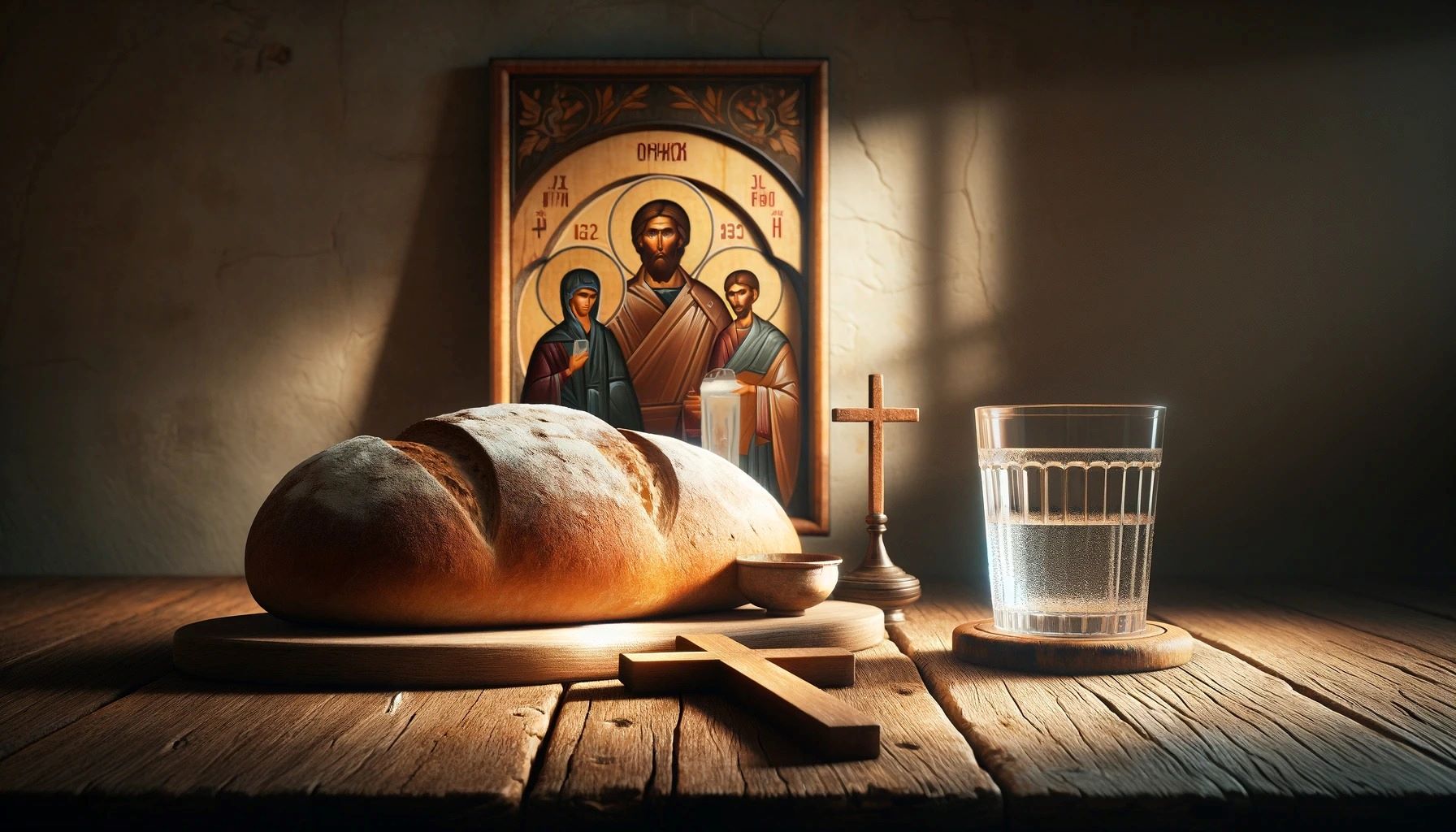Home>Special Themes>When Should You Break Your Fast During Lent?


Special Themes
When Should You Break Your Fast During Lent?
Published: February 27, 2024
Jason DeRose, Managing Editor at Christian.net, uses his expertise in religion and journalism to deepen understanding of faith's societal impacts. His editorial leadership, coupled with a strong academic background, enriches the platform’s diverse content, earning him recognition in both journalism and religious circles.
Discover the significance of breaking your fast during Lent and learn when it's appropriate to do so. Explore special themes and traditions associated with this religious observance.
(Many of the links in this article redirect to a specific reviewed product. Your purchase of these products through affiliate links helps to generate commission for Christian.net, at no extra cost. Learn more)
Table of Contents
The Importance of Fasting During Lent
-
Spiritual Discipline: Fasting during Lent holds significant importance in the Christian faith. It is a period of spiritual discipline, self-reflection, and repentance. By abstaining from certain foods or activities, individuals aim to emulate the 40 days that Jesus spent fasting in the wilderness.
-
Renewal and Cleansing: Lenten fasting is also a time for renewal and cleansing. It allows individuals to refocus their priorities, detach from worldly distractions, and deepen their connection with God through prayer and contemplation.
-
Identification with Christ's Sacrifice: Through fasting, Christians identify with the sacrifice of Jesus Christ. It serves as a reminder of the suffering and self-denial that Christ endured for the salvation of humanity.
-
Community and Solidarity: Fasting during Lent fosters a sense of community and solidarity among believers. It is a shared practice that unites individuals in their commitment to spiritual growth and self-discipline.
-
Preparation for Easter: Lent culminates in the celebration of Easter, marking the resurrection of Jesus. Fasting during this period prepares individuals to fully embrace the joy and significance of the Easter season.
-
Humility and Gratitude: Fasting encourages humility and gratitude. It prompts individuals to appreciate the blessings in their lives and empathize with those who may be experiencing hunger or hardship.
-
Seeking Forgiveness and Reconciliation: Lenten fasting provides an opportunity for seeking forgiveness and reconciliation, both with oneself and with others. It prompts introspection and the pursuit of inner peace and harmony.
-
Strengthening Willpower and Discipline: Engaging in fasting during Lent strengthens one's willpower and discipline. It requires commitment and self-control, fostering personal growth and resilience.
-
Drawing Closer to God: Ultimately, the importance of fasting during Lent lies in its capacity to draw individuals closer to God, fostering a deeper spiritual connection and a renewed sense of faith and purpose.
Read more: Why Fast During Lent
Understanding the Tradition of Breaking the Fast
-
Historical Significance: The tradition of breaking the fast during Lent carries deep historical and cultural significance within the Christian faith. It symbolizes the transition from a period of self-denial and spiritual introspection to a time of rejoicing and celebration, particularly in anticipation of Easter.
-
Symbolism of Renewal: Breaking the fast represents a symbolic act of renewal and rebirth. Just as Jesus emerged from the wilderness after fasting for 40 days, the act of breaking the fast signifies emerging from a period of spiritual discipline and entering into a season of spiritual and emotional rejuvenation.
-
Communal Gathering: In many Christian traditions, the breaking of the Lenten fast is often accompanied by communal gatherings, feasts, and special church services. This communal aspect emphasizes the shared experience of transitioning from a solemn, introspective period to a time of communal joy and fellowship.
-
Culmination of Spiritual Journey: The tradition of breaking the fast serves as the culmination of the Lenten spiritual journey. It marks the completion of the period of fasting and self-examination, allowing individuals to reflect on their spiritual growth and prepare to embrace the joyous significance of Easter.
-
Symbol of Hope and Anticipation: Breaking the fast also serves as a symbol of hope and anticipation. It represents the anticipation of the resurrection of Jesus and the promise of new life, reinforcing the central themes of redemption and spiritual transformation.
-
Expression of Gratitude: The act of breaking the fast is often accompanied by expressions of gratitude and thanksgiving. It provides an opportunity for individuals to reflect on the blessings in their lives and express gratitude for the spiritual insights gained during the period of fasting.
-
Transition to Joyful Observance: After the solemn observance of Lent, the tradition of breaking the fast signifies a transition to a period of joyful observance, celebrating the triumph of light over darkness and the victory of life over death.
-
Emphasis on Moderation and Balance: While breaking the fast allows for the enjoyment of food and fellowship, it also emphasizes the importance of moderation and balance. It encourages individuals to appreciate the nourishment of both body and spirit, promoting a holistic approach to well-being.
-
Continuation of Spiritual Practices: Although the Lenten fast is broken, the spiritual practices cultivated during this period, such as prayer, self-reflection, and acts of charity, continue to remain integral to the Christian journey, guiding individuals in their ongoing pursuit of spiritual growth and renewal.
Factors to Consider When Deciding When to Break Your Fast
-
Spiritual Readiness: Assess your spiritual readiness before breaking your fast. Reflect on whether you have achieved the spiritual goals you set for yourself during Lent. Consider if you have experienced the intended spiritual growth and self-discipline.
-
Church Tradition: Familiarize yourself with the traditions of your church or Christian denomination regarding the timing and manner of breaking the Lenten fast. Some churches have specific guidelines or communal rituals for breaking the fast, which can provide valuable guidance.
-
Personal Reflection: Engage in personal reflection to discern if you have reached a point of spiritual and emotional readiness to transition from the solemnity of fasting to the anticipation of Easter. Consider your inner state and whether you feel prepared for the symbolic shift in focus.
-
Physical Well-being: Take into account your physical well-being when deciding to break your fast. If you are experiencing any adverse health effects due to fasting, it may be necessary to break the fast earlier than planned. Prioritize your health and seek medical advice if needed.
-
Mental and Emotional State: Consider your mental and emotional state during the fasting period. If you are feeling excessively fatigued, emotionally drained, or mentally strained, it may be a sign that breaking the fast is necessary to restore balance and well-being.
-
Family and Community Practices: If you are part of a family or community that observes Lent together, consider the collective practices and traditions. Discuss with family members or fellow believers to align your decision with communal observances and to partake in the shared experience of breaking the fast.
-
Spiritual Guidance: Seek spiritual guidance from clergy, mentors, or trusted individuals within your faith community. Their wisdom and insight can offer valuable perspectives on the appropriate timing for breaking the fast, taking into account both spiritual and practical considerations.
-
Intentions and Commitments: Evaluate the intentions and commitments you made at the beginning of Lent. Assess whether you have remained true to your spiritual commitments and whether breaking the fast aligns with the spiritual journey you embarked upon at the start of the season.
-
Prayer and Discernment: Engage in prayer and discernment to seek clarity and guidance regarding the timing of breaking your fast. Allow moments of quiet contemplation to connect with your inner spiritual compass and to discern the most appropriate timing for this significant transition.
-
Balancing Tradition and Individual Needs: Strike a balance between honoring the traditions of Lent and considering your individual needs. While respecting the collective observance of Lent, recognize that each person's spiritual journey is unique, and the decision to break the fast should align with your personal spiritual path.
Remember, the decision to break your fast during Lent is a deeply personal and spiritual one, influenced by a combination of factors related to faith, well-being, and communal practices. Take the time to consider these factors thoughtfully and prayerfully as you navigate this pivotal moment in your Lenten journey.
The Role of Personal Health and Well-being
-
Physical Well-being: Prioritizing personal health and well-being is paramount when observing the Lenten fast. It is essential to pay close attention to the physical effects of fasting on the body. If fasting begins to compromise one's physical health, it may be necessary to consider breaking the fast. Symptoms such as dizziness, weakness, dehydration, or any other adverse effects should not be ignored. It is crucial to listen to the body's signals and respond with care and attentiveness.
-
Nutritional Balance: While fasting, maintaining a balanced nutritional intake is vital for sustaining overall well-being. If the fast is significantly impacting one's ability to meet basic nutritional needs, it may be a sign to break the fast. Nutritional deficiencies can lead to a decline in health and energy levels, which can hinder one's ability to fully engage in spiritual practices and reflection.
-
Mental and Emotional Wellness: The Lenten fast can also impact mental and emotional well-being. If fasting begins to take a toll on mental clarity, emotional stability, or overall psychological health, it is essential to address these concerns. Prolonged fasting that leads to heightened anxiety, depression, or emotional distress may necessitate a reevaluation of the fasting practice in consideration of personal well-being.
-
Medical Considerations: Individuals with pre-existing medical conditions should approach fasting with caution and seek guidance from healthcare professionals. Conditions such as diabetes, cardiovascular issues, or eating disorders require careful management during fasting. It is crucial to consult with a healthcare provider to determine the appropriateness of fasting and to establish a plan that safeguards both spiritual observance and personal health.
-
Self-care and Compassion: Practicing self-care and self-compassion is integral to maintaining personal well-being during the Lenten fast. It is important to recognize that honoring one's physical and emotional needs is not contradictory to the spiritual significance of Lent. Compassion towards oneself and the acknowledgment of personal limitations are essential aspects of a holistic approach to well-being during the fasting period.
-
Balancing Spiritual Commitment and Physical Health: Striking a balance between spiritual commitment and physical health is crucial. While the Lenten fast holds deep spiritual significance, it should not come at the expense of one's health and well-being. The decision to break the fast due to health concerns is not a sign of spiritual weakness but rather a demonstration of responsible stewardship of the body, which is considered a temple in Christian teachings.
-
Seeking Support and Guidance: Individuals navigating the intersection of personal health and Lenten fasting should seek support and guidance from spiritual leaders, mentors, and healthcare professionals. Open and honest communication about health concerns and the impact of fasting on well-being can provide valuable insights and assistance in making informed decisions that honor both spiritual and physical needs.
-
Adaptation and Flexibility: Embracing adaptability and flexibility in fasting practices is essential when considering personal health and well-being. It may be necessary to modify the fasting approach or timeline to ensure that it aligns with individual health requirements. This adaptive approach demonstrates a conscientious commitment to both the spiritual essence of Lent and the preservation of personal well-being.
-
Holistic Approach to Lenten Observance: Ultimately, recognizing the interconnectedness of body, mind, and spirit is fundamental to a holistic approach to Lenten observance. The Lenten fast should be viewed within the broader context of nurturing overall well-being, encompassing physical, emotional, and spiritual dimensions. By integrating these aspects, individuals can engage in the Lenten journey with a profound sense of wholeness and reverence for the gift of life and health.
In summary, the role of personal health and well-being in the context of Lenten fasting is a vital consideration that underscores the importance of nurturing the whole self—body, mind, and spirit—within the framework of spiritual observance. It is a testament to the holistic nature of the Lenten journey and the inherent value of honoring one's well-being as an integral part of the Lenten experience.
Balancing Spiritual Discipline with Physical Needs
The delicate balance between spiritual discipline and physical needs is a central consideration when observing the Lenten fast. It requires a conscientious approach that acknowledges the significance of spiritual devotion while honoring the body as a vessel of divine creation. Here are essential insights into navigating this balance:
-
Respect for the Body: Recognizing the body as a sacred entity is fundamental to balancing spiritual discipline with physical needs. In Christian teachings, the body is often regarded as a temple of the Holy Spirit, deserving of reverence and care. This perspective underscores the importance of upholding the body's well-being while engaging in spiritual practices, including fasting.
-
Mindful Self-awareness: Cultivating mindful self-awareness is pivotal in balancing spiritual discipline with physical needs. It involves attuning oneself to the body's signals and responding with attentiveness. By being attuned to physical cues and needs, individuals can make informed decisions that honor both their spiritual commitments and their bodily requirements.
-
Adherence to Moderation: Embracing moderation in fasting practices is a manifestation of the balance between spiritual discipline and physical needs. It entails avoiding extremes and adopting a measured approach to fasting that sustains spiritual focus while safeguarding the body's essential nourishment and well-being.
-
Compassionate Understanding: Extending compassionate understanding towards one's physical limitations is integral to achieving equilibrium between spiritual discipline and physical needs. It involves acknowledging that each individual's capacity for fasting may vary, and that honoring one's physical needs is not antithetical to the pursuit of spiritual growth.
-
Integration of Prayer and Reflection: Integrating prayer and reflection into the fasting experience fosters a harmonious alignment of spiritual discipline and physical needs. Engaging in prayerful contemplation allows individuals to draw strength and guidance, nurturing both the spirit and the body as they navigate the Lenten journey.
-
Consultation with Spiritual Guides: Seeking guidance from spiritual mentors and leaders can provide invaluable insights into balancing spiritual discipline with physical needs. Their wisdom and counsel can offer clarity and reassurance, guiding individuals in navigating the complexities of fasting while upholding their physical well-being.
-
Flexibility and Adaptability: Embracing flexibility and adaptability in fasting practices is essential to harmonizing spiritual discipline with physical needs. It involves being responsive to the body's requirements and making adjustments to fasting routines as necessary, demonstrating a holistic approach that honors both spiritual and physical dimensions.
-
Emphasis on Nourishment: Placing emphasis on nourishment, both spiritual and physical, underscores the integration of spiritual discipline with physical needs. It involves recognizing that sustenance for the soul and sustenance for the body are interconnected, and that both are essential for the holistic well-being of an individual.
-
Stewardship of the Body: Viewing the body as a trust to be upheld and nurtured aligns with the concept of balancing spiritual discipline with physical needs. It reflects a sense of stewardship, acknowledging the responsibility to care for the body while engaging in spiritual practices, including the observance of Lenten fasting.
-
Holistic Well-being: Ultimately, the pursuit of holistic well-being encapsulates the harmonious balance between spiritual discipline and physical needs. It encompasses a reverence for the interconnectedness of body, mind, and spirit, emphasizing the intrinsic value of nurturing the complete self within the context of Lenten observance.
In essence, balancing spiritual discipline with physical needs during the Lenten fast is a profound endeavor that calls for mindfulness, compassion, and a holistic perspective. It embodies the integration of spiritual devotion and bodily reverence, reflecting the profound interconnectedness of the human experience within the framework of faith and well-being.















